10 Questions for François Ozon | reviews, news & interviews
10 Questions for François Ozon
10 Questions for François Ozon
The French director reflects on 'my most Hitchcockian film'
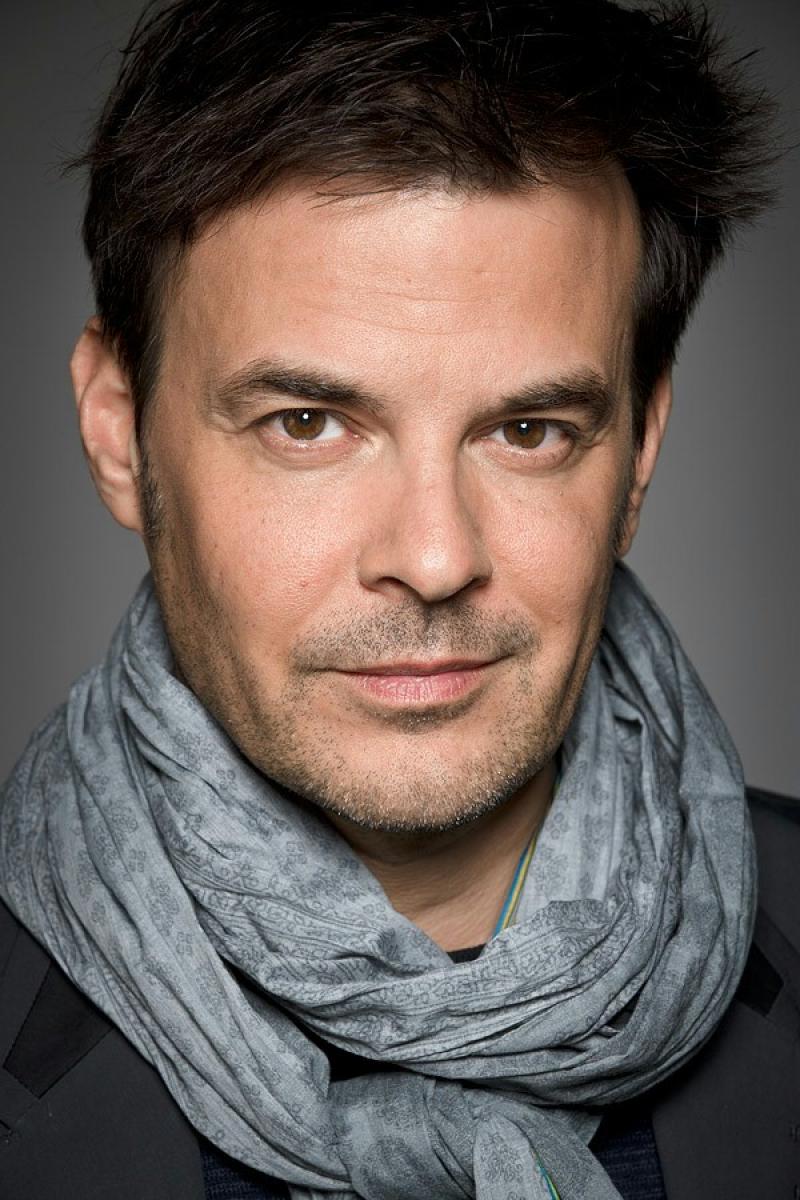
François Ozon is one of France’s most mercurial directors, his country’s equivalent, in some respects, to our own Michael Winterbottom – prolific, and constantly on the move between genres. He’s made a musical (8 Women), a marital drama (5x2), a murder mystery (Swimming Pool), a period melodrama (Angel), political satire (Potiche) and a poignant drama about a young man coping with his imminent death (Time to Leave), among others.
All these traits are on display in his latest, In the House. Adapted from the Spanish play The Boy in the Last Row, by Juan Mayorga, this quite dazzling film concerns the complex relationship that develops between a school teacher and a 16-year-old pupil in a suburban high school.
'In the House' stars that master of fuss and fluster, Fabrice Luchini
Germain is a demanding and proportionately disappointed teacher, whose interest is suddenly aroused by a writing assignment from the young Claude. The self-possessed boy admits that he has ingratiated himself into the home life of his classmate, Rafa, in a shamelessly voyeuristic pursuit for material. Though wary of the exploitation, the teacher is so invigorated by this rare promise in his classroom that he becomes a willing mentor – guiding not only the writing but the relationships within the house that inform it, including Claude’s growing infatuation with his friend’s mother. As reality and fiction become entwined, the teacher enters dangerous territory, both professionally and personally.
In some respects this reminds me of Ozon’s third film, Water Drops on Burning Rocks (2000). Both are adapted from stage plays by Ozon himself, both involve characters whose relations change in unexpected ways, and both are hugely seductive – witty, cunning, casually gripping.
In the House stars that master of fuss and fluster Fabrice Luchini, as Germain, impressive newcomer Ernst Umhauer as the boy, and Kristin Scott Thomas as Germain’s art dealer wife Jeanne, who finds herself becoming a character in this story-within-a story. I met Ozon in Paris, shortly after his film’s successful French release.
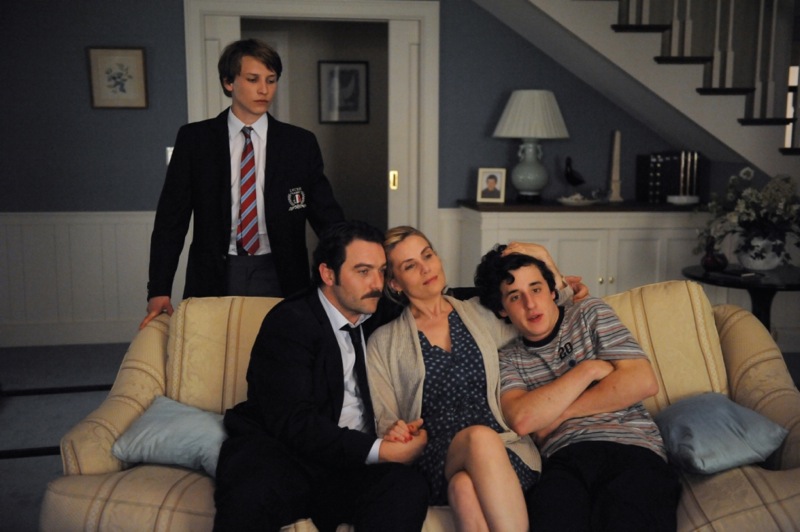 DEMETRIOS MATHEOU: Why did you choose to adapt Juan Mayorga’s play?
DEMETRIOS MATHEOU: Why did you choose to adapt Juan Mayorga’s play?
FRANCOIS OZON: I saw the play four or five years ago. An actress friend of mine was in it and told me, "It’s a play for you". When I saw the title, The Boy in the Last Row, I was intrigued. And when I saw it, I immediately had the feeling that this was an opportunity for me to speak about my process of working in cinema. The back-and-forth between reality and writing lends itself to a playful reflection on storytelling, what it is to create, what it is to be an audience.
I also liked the way Mayorga was able to show the relationship between the teacher and the student. Usually students learn from their teachers, but here the learning goes both ways. And you never know exactly who is manipulating who. So it was exciting. I remember at the beginning of my career some people said I was "too much a manipulator". But a director is a manipulator, you have to assume that. Hitchcock was maybe the first director who really took that on board.
Hitchcock also dealt with voyeurism, which is a significant aspect of this film.
This is my most Hitchcockian film actually, because it’s the one that really embraces the whole voyeurism aspect. I identify with the characters both of Claude and Germain. I’m like them. I could be sitting on a bench spying on people and trying to find new stories.
That relationship is very strong. Did you have a teacher like that?
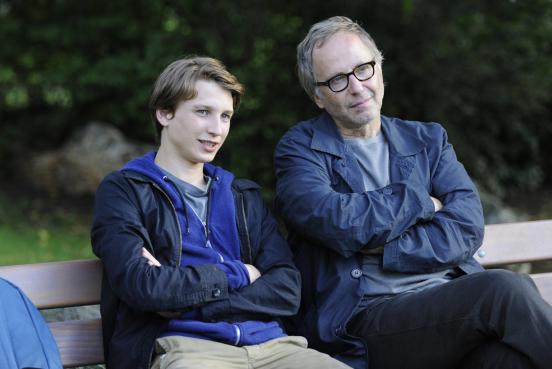 Not quite like Germain. But I had some teachers who were very important, especially when I began to study cinema, like Eric Rohmer. Also my parents are teachers. I know what a drag it is to grade papers at the weekend, pet students, tensions with administrators. I had a good handle on the subject.
Not quite like Germain. But I had some teachers who were very important, especially when I began to study cinema, like Eric Rohmer. Also my parents are teachers. I know what a drag it is to grade papers at the weekend, pet students, tensions with administrators. I had a good handle on the subject.
What were some of the considerations of the adaptation? The story within the story could have been difficult to manage.
Yes, and the fundamental question was how to represent Claude’s writing. The first instalment is read in its entirety by Germain, to his wife; we see nothing other than the act of reading it aloud. The second instalment is visualized and spoken in voiceover by the narrator, Claude. As the film progresses, there is less and less voiceover. Dialogue and images take over: it’s cinema.
You know the first idea for this, when I discovered the play, was to do the film in England, because I had a feeling that it could work with the idea we have of the English school, with their school uniforms, the relationship between teacher and student in England. But I realised it was too much work and I wanted to shoot quickly, so I gave that up.
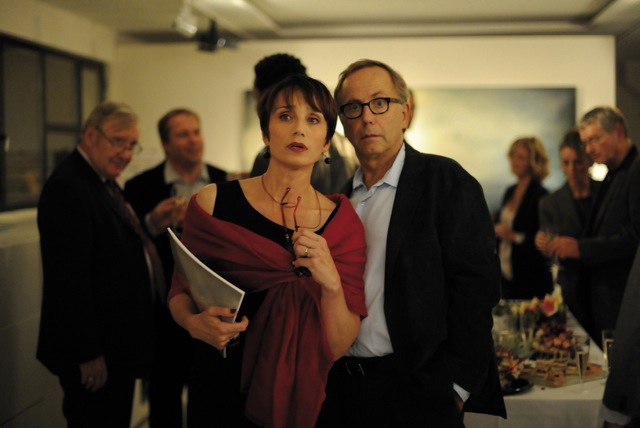
There are a number of tonal shifts within the film, often within the same scenes, between drama, comedy, arguably even psycho-thriller.
The story offered a good opportunity to follow the tone of the boy’s writing. At some moments he doesn’t know which direction to go. That’s why Germain says to him, "What do you want to do? Do you want to do a comedy, do you want to do a grotesque caricature, a thriller?" As a director I had this challenge to follow all these different tones, with the mise en scène, with the music. I like to mix genres in movies, and this film was the perfect place to do that.
The mayhem caused by Germain within the family, some of it amorous, unavoidably evokes Pasolini’s Theorem.
I wanted the same sort of chemistry between Luchini and Kristin that Woody Allen and Diane Keaton had
Actually the only time I’ve seen Theorem was with German subtitles, so I think I have a fantasy of the film, I’m not sure I’ve really seen it. But in the case of In the House the fact that Fabrice asks the boy, "Do you want to have sex with the mother, with the son, the father?" means it was inevitable that cinephiles would rush to make the reference to Pasolini.
There are also little nods to Woody Allen – an explicit one, when they go to see Match Point at a cinema, and perhaps implicitly in the relationship between these bourgeois intellectuals Germain and Jeanne.
Actually, we thought of Woody Allen in the preparation of those characters. I think it was a good reference for this intellectual couple who have a theory about everything yet contradict themselves in their actions. And I wanted the same sort of chemistry between Luchini and Kristin (pictured above) that Woody Allen and Diane Keaton had in their films. We had Keaton in mind for the costumes, too, for Jeanne in her gallery.
Match Point was a little bit by chance. In the script they go to the cinema. And when it was time to shoot the scene, the set designer said to me, "We have to book the poster, what film do you want?" I had no idea, then I said Match Point. And now everybody analyzes the choice. It’s a film I really like. I know the English hate this movie, but in France we like it.
Can you say something about Fabrice Luchini? He was a wonderful comic villain for you in Potiche, and is an extremely flawed yet engaging centre of this film.
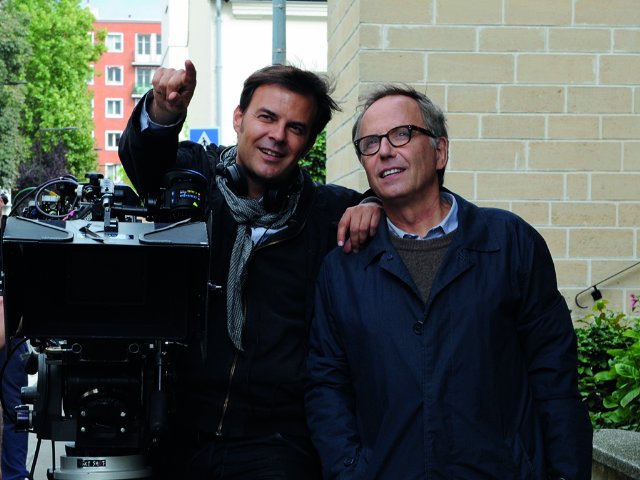 I really like Fabrice as an actor. He can be a Stradivarius, but very often film directors are afraid of him and afraid to direct him, so people say "Luchini does Luchini". Actually he doesn’t like movies. What he likes is theatre, and literature. He does cinema for money. But I think he respects me, because Potiche was successful, and because I was the student of Eric Rohmer, and he began with Rohmer, so we have a complicity about that, and he loved the character of the teacher, it gave him a chance to express his love for literature. In fact, he got so involved in the role, that in some scenes he would add lines - I couldn’t get Germain to stop advising Claude about writing.
I really like Fabrice as an actor. He can be a Stradivarius, but very often film directors are afraid of him and afraid to direct him, so people say "Luchini does Luchini". Actually he doesn’t like movies. What he likes is theatre, and literature. He does cinema for money. But I think he respects me, because Potiche was successful, and because I was the student of Eric Rohmer, and he began with Rohmer, so we have a complicity about that, and he loved the character of the teacher, it gave him a chance to express his love for literature. In fact, he got so involved in the role, that in some scenes he would add lines - I couldn’t get Germain to stop advising Claude about writing.
Germain says to the boy, "It’s harder to look closely without judging". It strikes me that one of the characteristics of your films is that while your characters are often diabolical in one way or another, you’re not really judging them.
There are many lines in the film that you can apply to my own work. Yes, I don’t try to judge, I try to understand, and to be close to the characters, even if they are diabolique. I think the work of a director is to like his characters; if it’s just to say he’s good, he’s bad, it’s not interesting for me.
There is a loneliness to these characters, they are looking for a place in the world, and that’s very touching. They all have their flaws, especially the characters in Rafa’s house; at the beginning they are caricatures, but step by step they become more complex, and deeper. At the end I think it’s the way Claude is looking at them, it changes, he begins to love them.
You say this project was a way of reflecting on your process as a filmmaker. Since this is a story about writing, and you write your own scripts, how do you feel about this part of your process?
I hate writing – the fact that I’m alone, it’s not concrete, it’s imagination, and the knowledge that your writing has to convince the producer to find money and actors to join you. For me it’s a duty. Now it’s easier, because I’ve had some success, people respect my work, it’s not so difficult to finance my movies. But when I was younger I really felt the pressure.
At the same time, I’ve had some good scripts offered by other writers and have refused to use them. So maybe I need to write myself, even if I don’t like it, this process of writing is useful, it’s a way for me to start work on the mise en scène.
But I would love to have some very good scripts and just be able to shoot. Or maybe just a synopsis, and some actors who are my slaves. Yes, that would be the best.
- In the House is released on Friday 29 March
Watch the trailer for In the House
The future of Arts Journalism
You can stop theartsdesk.com closing!
We urgently need financing to survive. Our fundraising drive has thus far raised £49,000 but we need to reach £100,000 or we will be forced to close. Please contribute here: https://gofund.me/c3f6033d
And if you can forward this information to anyone who might assist, we’d be grateful.

Subscribe to theartsdesk.com
Thank you for continuing to read our work on theartsdesk.com. For unlimited access to every article in its entirety, including our archive of more than 15,000 pieces, we're asking for £5 per month or £40 per year. We feel it's a very good deal, and hope you do too.
To take a subscription now simply click here.
And if you're looking for that extra gift for a friend or family member, why not treat them to a theartsdesk.com gift subscription?
more Film
 London Film Festival 2025 - a Korean masterclass in black comedy and a Camus classic effectively realised
New films from Park Chan-wook, Gianfranco Rosi, François Ozon, Ildikó Enyedi and more
London Film Festival 2025 - a Korean masterclass in black comedy and a Camus classic effectively realised
New films from Park Chan-wook, Gianfranco Rosi, François Ozon, Ildikó Enyedi and more
 After the Hunt review - muddled #MeToo provocation
Julia Roberts excels despite misfiring drama
After the Hunt review - muddled #MeToo provocation
Julia Roberts excels despite misfiring drama
 Ballad of a Small Player review - Colin Farrell's all in as a gambler down on his luck
Conclave director Edward Berger swaps the Vatican for Asia's sin city
Ballad of a Small Player review - Colin Farrell's all in as a gambler down on his luck
Conclave director Edward Berger swaps the Vatican for Asia's sin city
 London Film Festival 2025 - Bradley Cooper channels John Bishop, the Boss goes to Nebraska, and a French pandemic
... not to mention Kristen Stewart's directing debut and a punchy prison drama
London Film Festival 2025 - Bradley Cooper channels John Bishop, the Boss goes to Nebraska, and a French pandemic
... not to mention Kristen Stewart's directing debut and a punchy prison drama
 London Film Festival 2025 - from paranoia in Brazil and Iran, to light relief in New York and Tuscany
'Jay Kelly' disappoints, 'It Was Just an Accident' doesn't
London Film Festival 2025 - from paranoia in Brazil and Iran, to light relief in New York and Tuscany
'Jay Kelly' disappoints, 'It Was Just an Accident' doesn't
 Iron Ladies review - working-class heroines of the Miners' Strike
Documentary salutes the staunch women who fought Thatcher's pit closures
Iron Ladies review - working-class heroines of the Miners' Strike
Documentary salutes the staunch women who fought Thatcher's pit closures
 Blu-ray: The Man in the White Suit
Ealing Studios' prescient black comedy, as sharp as ever
Blu-ray: The Man in the White Suit
Ealing Studios' prescient black comedy, as sharp as ever
 The Woman in Cabin 10 review - Scandi noir meets Agatha Christie on a superyacht
Reason goes overboard on a seagoing mystery thriller
The Woman in Cabin 10 review - Scandi noir meets Agatha Christie on a superyacht
Reason goes overboard on a seagoing mystery thriller
 London Film Festival 2025 - crime, punishment, pop stars and shrinks
Daniel Craig investigates, Jodie Foster speaks French and Colin Farrell has a gambling habit
London Film Festival 2025 - crime, punishment, pop stars and shrinks
Daniel Craig investigates, Jodie Foster speaks French and Colin Farrell has a gambling habit
 I Swear review - taking stock of Tourette's
A sharp and moving tale of cuss-words and tics
I Swear review - taking stock of Tourette's
A sharp and moving tale of cuss-words and tics
 A House of Dynamite review - the final countdown
Kathryn Bigelow's cautionary tale sets the nuclear clock ticking again
A House of Dynamite review - the final countdown
Kathryn Bigelow's cautionary tale sets the nuclear clock ticking again

Add comment